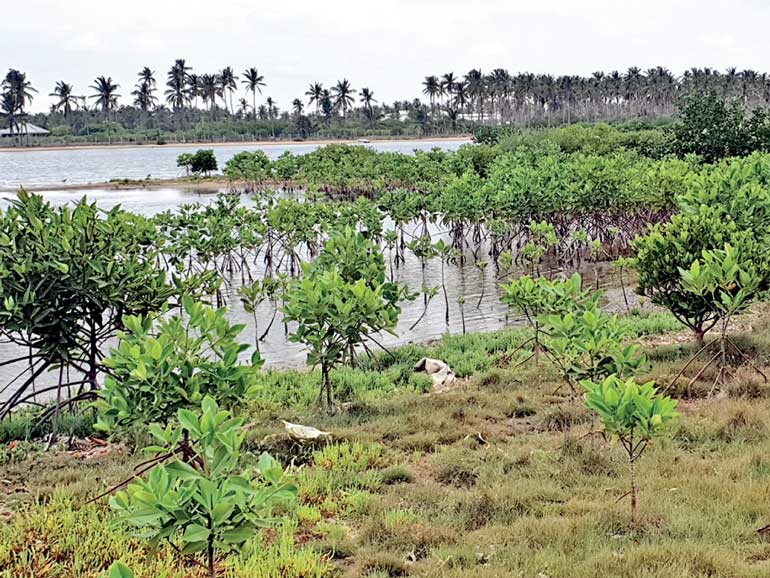International Mangrove Day 2021: Celebrating Sri Lanka’s mangroves
 |
Saturday, 31 July 2021
On 26 July, the world celebrated the International Day for the Conservation of the Mangrove Ecosystem. Many different organisations and individuals came together to highlight the importance and value of these unique ecosystems, showcase conservation initiatives, and make a strong case to enhance their protection.
Mangrove forests are special. They inhabit a space at the border of land and sea and are uniquely suited for a coastal environment of rising and ebbing tides, shifting currents, and brackish water, having evolved specialised tools to overcome these challenges.
Mangroves are the only species of tree that can tolerate and thrive in saltwater, using their roots and leaves to filtrate salt from the water. Their large stilt roots provide structural support and allow them to withstand floods and currents while their above-ground roots help them breath even while submerged in water.
If surviving these conditions is the first defining traits of mangroves, the abundance of their ecosystem services and biodiversity is the second. Mangroves regulate their environment and anchor coastlines against erosion and floods; they provide resources and products such as herbs, medicinal ingredients, mangrove apples, cork, or timber; they shelter and nurse animals and other plants, creating a habitat for many aquatic and terrestrial species; and they sequester huge amounts of greenhouse gas emissions.
World-wide, mangroves line the coasts of almost 120 countries, including Sri Lanka. In many areas around the world, they have been cut down and diminished over decades and are projected to further decline as global warming progresses. Pollution, waste, sea level rise, climate change impacts, and human development activities threaten mangrove ecosystems as well as the coastal communities around them – but there is still time to reverse this trend.
Many actions can be taken to secure a better future for mangroves. Firstly, the drivers of deforestation and degradation should be addressed, for example by reducing greenhouse gas emissions, improving waste and pollution management, establishing integrated coastal zone management, enforcing more sustainable use of ecosystem services, or declaring protected areas to conserve mangrove habitats.
Secondly, planting mangroves is a way to help these ecosystems take back degraded land if careful attention is paid to location, hydrology, mangrove species, and sustainability of the planting. Technical knowledge of mangrove biology needs to be taken into account together with traditional knowledge of the landscape and the composition of local mangrove ecosystems. In some cases, it is possible to let existing mangrove forests grow naturally by providing them space and removing threats and obstacles; in others, degraded ecosystems can be rehabilitated back to full health.
A third way to protect mangroves is through awareness creation and capacity-building on their benefits and livelihood opportunities, for example through sustainable fisheries, wetland handicraft, or ecotourism. It is possible to create training sessions or certificate courses for community members, mainstream mangrove knowledge into existing school curricula, and include mangrove ecotourism as an element in tourism industry trainings. If communities, local authorities, civil society, and the private sector are informed and empowered to contribute, this has the potential to make mangrove conservation more effective and create structures for long-term care, gap filling, assisted growth, and monitoring.
International Mangrove Day provides an opportunity for Sri Lanka and countries across the world to take stock of existing mangrove forests and enhance their protection. If we consider ways to rehabilitate, restore, and expand these vital ecosystems, they will benefit the climate, the environment, biodiversity, human livelihoods, and the wellbeing of coastal communities.
(The writer works as Director – Research & Knowledge Management at SLYCAN Trust, a non-profit think tank based in Sri Lanka. His work focuses on climate change, adaptation, ecosystem conservation, just transition, human mobility, and a range of related issues. He holds a Master’s degree in Education from the University of Cologne, Germany and is a regular writer to several international and local media outlets.)



No comments:
Post a Comment
Note: only a member of this blog may post a comment.